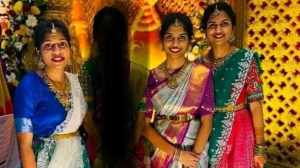Can’t ask Parliament to make a law: SC reserves verdict on same-sex marriage
A five-judge Constitution bench presided by Chief Justice of India D Y Chandrachud was responding to arguments that a mere declaration by the court that same sex couples have the right to marry would not serve the purpose.
 While the petitioners have sought legal recognition by rewording The Special Marriage Act (SMA), 1954, the Centre has maintained that the matter is sensitive and is best left to the legislature.
While the petitioners have sought legal recognition by rewording The Special Marriage Act (SMA), 1954, the Centre has maintained that the matter is sensitive and is best left to the legislature. THE SUPREME Court on Thursday reserved its verdict on petitions seeking legal recognition of same sex marriage, after a hearing lasting 10 days. The top court reiterated that it cannot ask Parliament to make a law or enter the realm of policy making.
A five-judge Constitution bench presided by Chief Justice of India D Y Chandrachud was responding to arguments that a mere declaration by the court that same sex couples have the right to marry would not serve the purpose.
“There’s a constitutional doctrine that we have remained constant to — we cannot direct legislation, we cannot direct framing of a policy, we cannot enter the realm of policy making,” Justice S R Bhat, who was a part of the bench, said.
While the petitioners have sought legal recognition by rewording The Special Marriage Act (SMA), 1954, the Centre has maintained that the matter is sensitive and is best left to the legislature.
Senior Advocate A M Singhvi appearing for some of the petitioners told the bench, also comprising Justices S K Kaul, Hima Kohli and P S Narasimha, that a civil union, as permitted in some countries, is not a solution to what same sex couples are asking for. It is not an equal alternative and does not address the constitutional anomaly presented by exclusion of non-heterosexual couples from the institution of marriage, he contended.
Singhvi said by excluding same-sex couples from civil marriage, the State declares that it is legitimate to differentiate between their commitments and commitments of heterosexual couples.
He said ultimately the message is that what same-sex couples have is not as important or significant as “real” marriages and that such “lesser relationships” cannot have the name of marriage.
Senior advocate Raju Ramachandran, also appearing for some petitioners, referred to a situation where the court only makes a declaration and leaves the rest to the legislature as in the case in triple talaq, transgender Act, data protection, among others. He said those were instances where the majority as reflected in the institution of legislature would have had no serious problem at all.
The CJI responded that it’s not something which the court can presume. “We cannot declare on how we assume Parliament would react.”
Ramachandran said he was only trying to say that the petitioners are an “unpopular minority” and that is why he was urging the court to walk the full mile and protect them.
Senior Advocate K V Vishwanathan said more than the right to marry, the question is if there is a corresponding duty in the Union to recognise the association of non-heterosexual couples as married couples in a non-discriminatory manner.
Arguing adoption rights for same sex couples, senior advocate Menaka Guruswamy said there are over 50 countries in the world that allow it. This is more than the number of countries that allow same sex marriages, she submitted.







